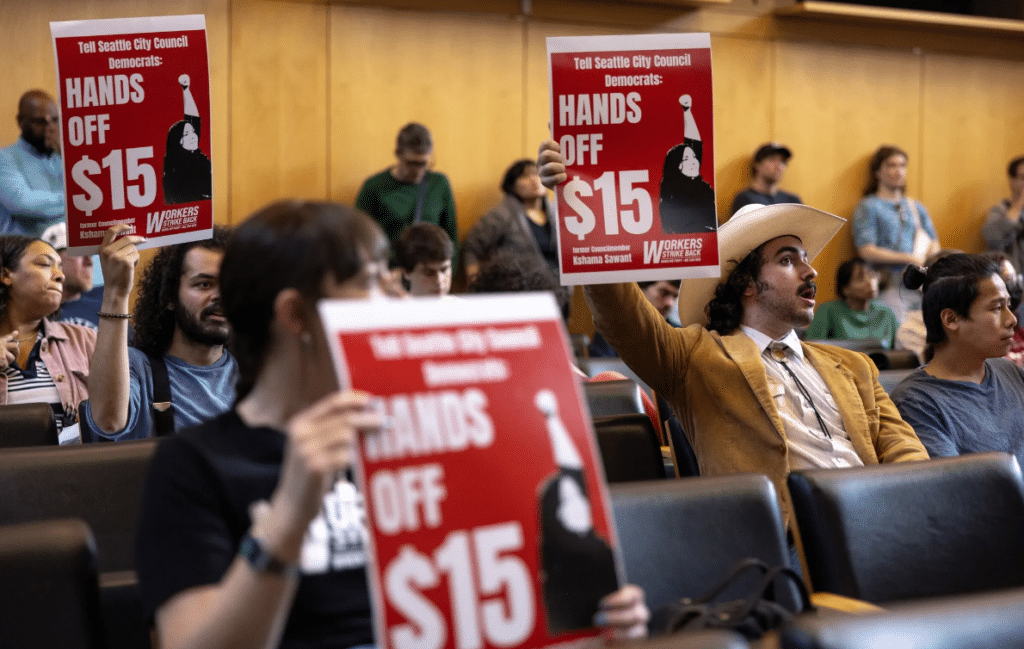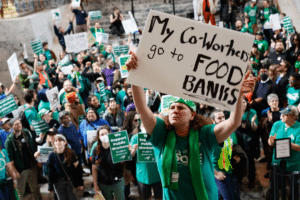
The Seattle Times
By David Kroman and Jackie Varriano
Updated July 31, 2024
A proposal from the Seattle City Council to throttle back next year’s minimum wage increase for small businesses is resurfacing familiar battle lines between business and labor as decade-old negotiations are relitigated in City Hall.
Coming out of a bruising pandemic, particularly for restaurants, elected officials view the step as a necessary release valve for struggling businesses, while labor advocates accuse the newly elected council of undercutting low-wage workers and reneging on a deal struck 10 years ago.
Councilmember Joy Hollingsworth, who introduced the proposal, said Tuesday she brought the bill to start a conversation and her plan is to engage all parties through the deliberations. But with just five months until the new wages go into effect — and precious little bandwidth as the council takes up its budget in the fall — the back-and-forth lobbying is likely to be intense.
“I am trying to find a solution that works for everyone to protect small businesses and so workers can have jobs and make a minimum wage as well,” she said.
The bill would allow businesses with fewer than 500 employees to continue crediting tips and benefits toward their minimum wage obligations. In practice, that means the minimum wage for workers in smaller restaurants or other tip-based industries are guaranteed a lower minimum wage than those working for large companies.
For labor groups, including those who endorsed Hollingsworth’s campaign, the bill is “unimaginable,” said Katie Garrow, executive secretary-treasurer of MLK Labor.
“It is unacceptable to require or rely on a business model that exploits poor people,” she said.
Credit for tips and benefits has been allowed under the city’s minimum wage law since 2015, but it was supposed to expire next year, meaning the minimum wage would be uniform across the city. For many restaurants that expiration date is likely to mean a more than $3 an hour increase next year.
Restaurant and hospitality industry lobbyists have been pressuring the council to extend those credits, arguing the wage hikes represent an existential moment for their businesses.
Defenders of the minimum wage law as it’s written have hit back strongly. Former Councilmember Kshama Sawant, who often takes credit for pressuring elected officials into adopting the higher minimum wage in the first place, held a small rally in City Hall.
Garrow of MLK Labor, a union of unions in King County, said they’re working to form a coalition of unions, workers and even some businesses to campaign against any changes to the law.
“I would say that we are totally, absolutely, resolutely opposed to the proposal to enact a sub-minimum wage permanently for some tipped workers,” she said.
Cleo Gallagher, member of the UFCW union, said during public comment Tuesday, “Instead of further punishing Seattle workers, it would be great to address the root causes of some of our shared issues. Decades of research shows us small businesses actually benefit from higher wages: less turnover, less training for their workers and consumers have more money to spend at their establishments.”
The deal to allow small businesses to credit tips and benefits for 10 years came out of the tense negotiations between business and labor in 2014. The phase-in period is what finally cleared the way for an agreement to make Seattle’s minimum wage the highest in the country.
In the years since, the $15 wage — shorthand for the standard that has since gone up to nearly $20 for many — has been politically safe territory for anyone seeking office in Seattle and kicked off a series of envelope-pushing labor laws from an increasingly progressive council.
With six out of nine members of the council taking office this year for the first time, the body has moderated significantly and has shown willingness to revisit the work of past councils.
The council is already embroiled in a drawn out fight over wages for app-based delivery drivers, which had been increased by the previous council.
Hollingsworth’s meetings with labor advocates are part of the reason that bill hasn’t progressed. She said she intends to proceed cautiously here as well. She’s already held meetings with labor representatives in her office this week.
“It’s not us versus them, it’s not politics and political statements,” she said. “I am literally trying to find a solution to a financial cliff.”
Hannah Sabio-Howell, communications director with the labor-backed Working Washington, has appreciated Hollingsworth’s recent discussions with labor. Still, she’s concerned “that this new council, under Council President Nelson’s leadership, will spend a massive amount of time trying to roll back low-wage workers’ pay and exclude workers from the process — which is not a solution to anyone’s problems.”
Brandon Pettit, owner of Seattle pizzerias Delancey and Dino’s Tomato Pie, says the proposed extension of the tip credit isn’t about restaurant owners “being greedy.” Rather, “they’re being squeezed so much there’s nothing left,” Pettit says.
Consider Delancey, Pettit’s long-running Ballard pizza shop. The pizzeria regularly has a wait, charges between $18 and $27 for pizzas and does around $1.4 million in annual sales. Pettit estimates the business would lose around 50% of annual profits should the tip credit expire.
At Delancey, many employees earn between $30 and $50 an hour, tips included. Bumping that pay an additional $3 an hour — which would happen if the tip credit expires — might seem like a small change, but Pettit says it would amount to “$50,000 for a 50-seat restaurant.”
Views among restaurants are not unanimous, however. Ian Courtnage, CEO of Evergreens restaurants, said the industry has had plenty of time to prepare for this moment. More than that, he said they already pay the higher minimum wage — a necessary step to attract workers.
“None of this will be easy, but the writing’s been on the wall for a long time,” he said.
Read the original article here.




